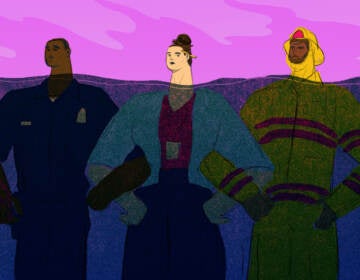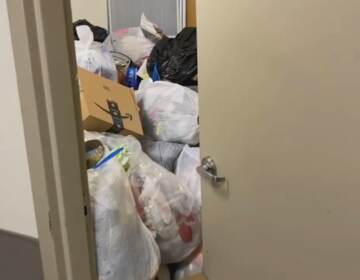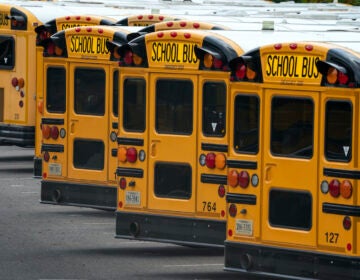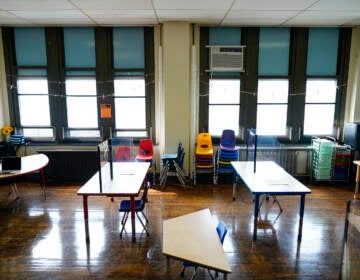Why do people leave college without getting a degree? A new Hope Center survey looks at the reasons
WHYY’s Cherri Gregg talked to Sara Goldrick-Rab, the center’s president, and Daniel Liberis, who left school then went back.
Listen 8:55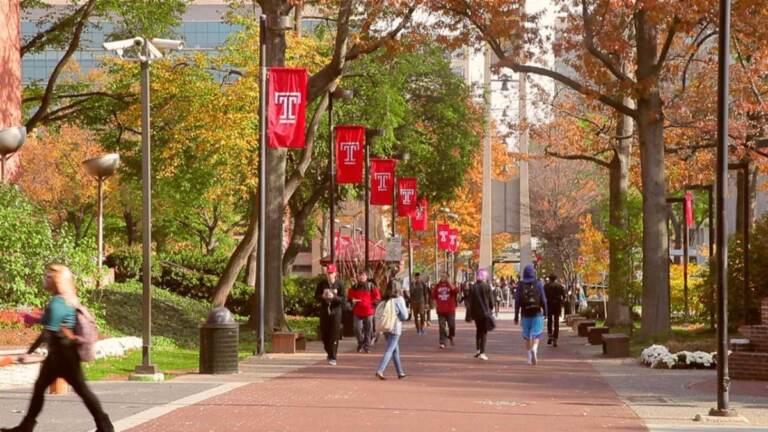
Temple University Campus (Courtesy of Hope Center for College, Community and Justice)
Philadelphia is home to more than 200,000 people who started college or postsecondary education, but did not get degrees. Who are they? And what would it take to get them back in school?
A new survey from the Hope Center for College, Community and Justice queries Philadelphia residents and identifies some of the challenges that out-of-school students face in trying to complete their education.
The survey includes responses from more than 900 Philadelphians, focusing on the experiences and opinions of individuals who had not completed a college degree but desired to do so.
Some of the key findings:
- Of the respondents who had not completed college, 72% were female and 52% were Black.
- Nearly 2 out of 5 of respondents without a college degree said rent and child care are not affordable while trying to attend college.
- One in 3 of the respondents who had not completed college said they would like to get a degree or certificate.
Sara Goldrick-Rab, a professor of sociology and medicine at Temple University, is president and founder of the Hope Center for College and Community. She sat down with WHYY’s Cherri Gregg to discuss the new study and its findings.
So you guys did some research about people who left college for a period and found some very interesting information. Tell me about the report.
Sara Goldrick-Rab: Yeah. Well, here in Philadelphia, we have probably about 200,000 people who started some kind of education after high school, but didn’t actually finish a degree. And what we wanted to understand was sort of, where are their heads? Do they want to be coming back to school? Is this something still very important to them? And if it is, what’s getting in the way? So we did a survey.
And what did you find?
SGR: First of all, we found that there are a lot of people who really do want to come back to school, but they’re really struggling. Nationally, when we talk about people who have some college but no degree, we often talk about trying to help them to understand the importance of college. But we don’t kind of get into the real talk, which is people have to be able to pay the bills. So the top couple of things that they’re dealing with that’s keeping them from coming back to school are tuition, living expenses, and child care. And what that says is that this isn’t just about doing a marketing campaign that says you should come back to college. It’s about getting real about what we got to give people, even if it’s some emergency aid, even if it’s helping them connect to a program so they can afford the bills, so they can come back and finish that degree and get on with their lives.
I got to throw it in here: Just because you didn’t graduate doesn’t mean you don’t get that student loan bill.
SGR: That’s right. And that’s real, and we got to be honest about it. So if you left college without a degree in the ’70s, to be honest with you, it was a little bit disappointing, but it wasn’t the end of the world. You might have discovered college is not for you. But even if you discovered that now, you walk away with a backpack full of debt and all you have is a high school degree. And so in many ways, you’re actually moving backwards. What does that look like when you talk to kids in your community and you talk to your own kids? Do you say, “You know it would be great if you went to college someday?” Or do you say with a really bad taste in your mouth like, “Well, guess what? That college did not help me.” And what does that do for our city across generations?
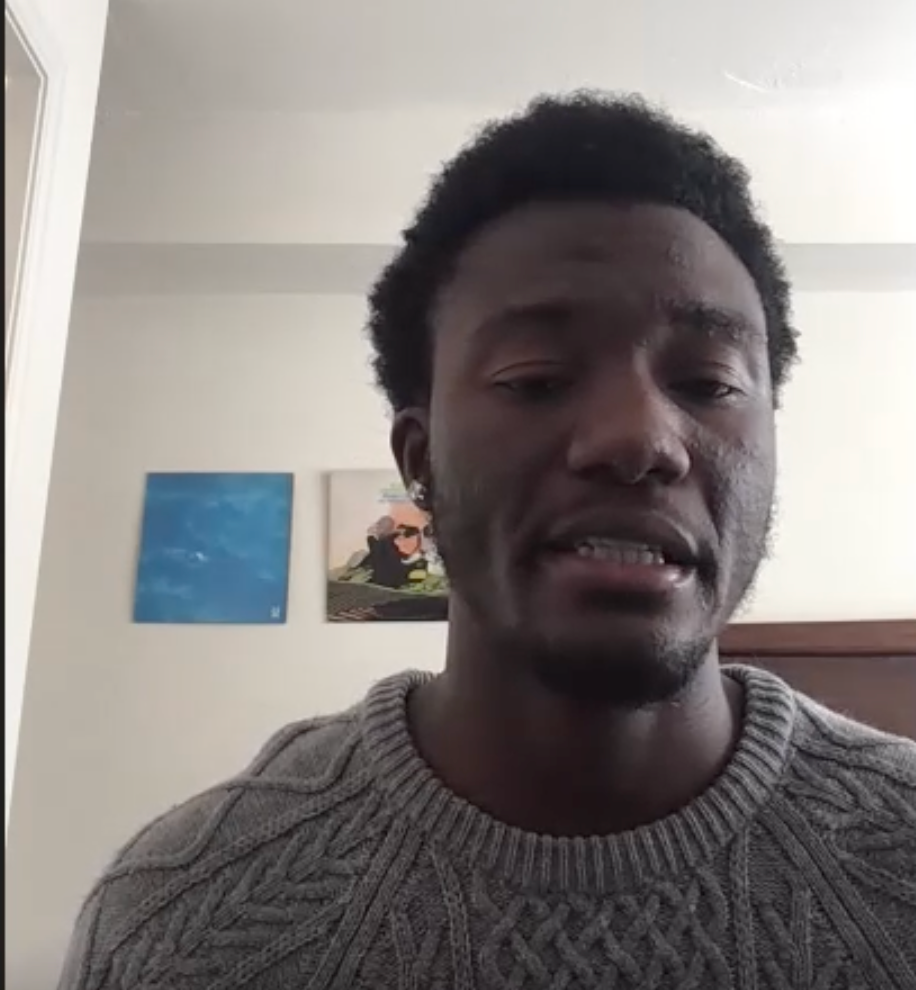
And I want to bring in Daniel Liberis, a student at Penn State currently. Tell us about your journey.
Daniel Liberis: Actually, I related to a lot of what she was talking about. I originally started off at Kutztown University. I was not prepped financially, mentally. I was a first-generation [college student]. My mom had started school but dropped out, actually, because she had kids. My father never bothered. He was the first generation in America, actually, come from Haiti. So I started … l and I did about two semesters. I didn’t get much credits out of it. I didn’t do much of a good job, and I had to leave because I actually couldn’t pay my bills. I actually didn’t have aid. I didn’t know how I was going to make things work. So I withdrew from the campus and I came home. I sat around for maybe about two or three months, kind of just soaking in and trying to figure out whether or not I actually wanted to go back to school. I actually got that push by finding inspiration from my mom. She’s 40, and she decided that she was going back to school. She came into my room one day and was like, “Listen, if I can do it, you can find a way to do it.” That’s when my journey into school restarted, and also understanding that I had help, talking to advisers. I’ve utilized the CARES Act. I’ve utilized a couple of emergency funds actually to help me get through.
Where are you now at Penn State?
DL: Yeah, I am a junior/senior. I find comfort knowing that we have programs. If I need SNAP, if I need emergency funds, it makes me a lot more comfortable. I’m actually doing pretty well. I’m enjoying. I believe that school is a great choice for young people that want to go and go to new heights and develop their own community in themselves and the people around them.
I have no doubt you will be graduating next year. And congratulations to you! I got to bring you back in here, Sara. Is Daniel’s story pretty typical?
SGR: I mean, there’s a couple of things about it that I absolutely love, and one is, what you went through in terms of thinking about, “Does this mean that college is not something that I’m good at? Does it mean I don’t belong?” Those are all things that we think about, and frankly, it can lead people to feel really insecure, even though, honestly, all that really went wrong was that they didn’t give you enough support … in the first place. I love that it’s your mom that helped you to come back, and one of the things to know is that actually can also work the other way now. A son’s going to school, and a mom goes. You know what? I never finished my education. Well, guess what? She can now come too. But the last part — and I think this is the most important thing — the programs that you just talked about, that CARES Act, that SNAP, those are programs paid for by the taxpayers of Pennsylvania. So we are actually, all together, helping you get through college. And that’s exactly what the solution is, because there is no way anymore. Nobody’s got bootstraps strong enough to get through this current situation alone. And those dollars that you access, those are federal dollars, pandemic relief. And it’s the first time in the history of the country … like you’re going to college at a very special moment when they actually funded that and it helped you. And the problem is those dollars are going to go away in about a year and a half to two years. And the question is what comes on the other side.
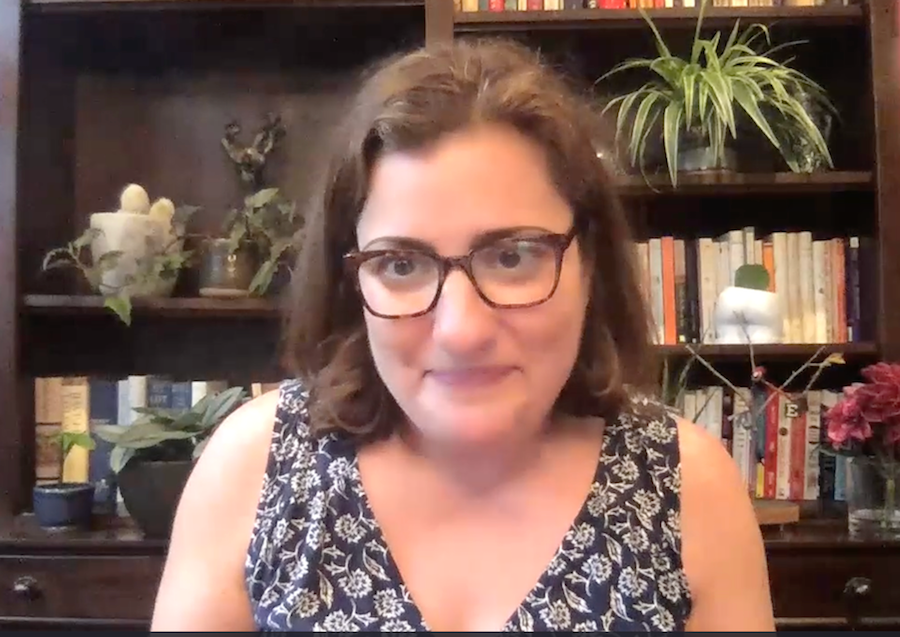
Is this sort of [a thing] people need to be jumping on right now? … Because it’s a scary thing. I know there’s efforts to make sure this is extended, but if you got a young person at home, maybe they didn’t [finish school] and they’ve been out of school for a couple of years. Should they be jumping on this? Because I don’t even know if people know about these funds.
SGR: Yeah, I know, they really should. So two things I would say that people can do right now. If you were ever thinking about going back to college, this is the time to do it, because almost every college around here, pretty much all of the real ones, by which I mean, like, not the ones you see on TV right now, don’t go to the for-profit colleges, right? But any of these other colleges, they have funds right now, and they’re allowed to help you to do things like, maybe you’re like, I can’t go back because I owe that school $1,000. Guess what? They actually might be able to clear it for you. Or maybe in order to come back you’re going to need extra help paying for books. They do have this money from the federal government, and like I said, they have a time limit on it, so it’s a good time to go back. It’s also a good time to go back because the economy is kind of messed up right now, and that is when people do tend to go. But then the other thing is now is the time to act and say, “What do we want this city and this state to be able to look like as we come out of this pandemic?” We cannot just set students up to graduate from high school. We have to help them so they can go to college. And so we can’t say, “Good job, you graduated from high school. Now do your FAFSA, and everything’s going to be OK.” Because guess what? Almost nothing is OK anymore when you just do the FAFSA.
What do you think, Daniel, you’ll be able to do once you graduate that you were not able to do having had only one year of school under your belt?
DL: Had I only had one year of college under my belt, my mindset would not have changed. My mindset would have been stagnant. I would want to stay where I was at. Being in school has made me want to get interested in investing in my community. I’m actually the judge of elections for this upcoming election. On top of that, I have my own LLC, I’m starting a nonprofit. And, you know, just growing. And I wouldn’t have been able to do that or have that opportunity if I had only one year of education.
Amen to that. So Sara, where can people find this study or weigh in on this topic?
SGR: We are at hope4college.com. And if anybody has trouble finding us, we’re also really proudly part of the medical school at Temple University, the Lewis Katz School of Medicine. And that’s the one thing I wanted to say at the end here. You know, the benefits of college education. It’s not about getting ahead of other people, it’s about building stronger communities. And the fact is that people who get more education, they live longer, healthier, happier lives, and their kids do too. And that’s what matters here.
 WHYY is one of over 20 news organizations producing Broke in Philly, a collaborative reporting project on solutions to poverty and the city’s push towards economic justice. Follow us at @BrokeInPhilly.
WHYY is one of over 20 news organizations producing Broke in Philly, a collaborative reporting project on solutions to poverty and the city’s push towards economic justice. Follow us at @BrokeInPhilly.

Get daily updates from WHYY News!
WHYY is your source for fact-based, in-depth journalism and information. As a nonprofit organization, we rely on financial support from readers like you. Please give today.



